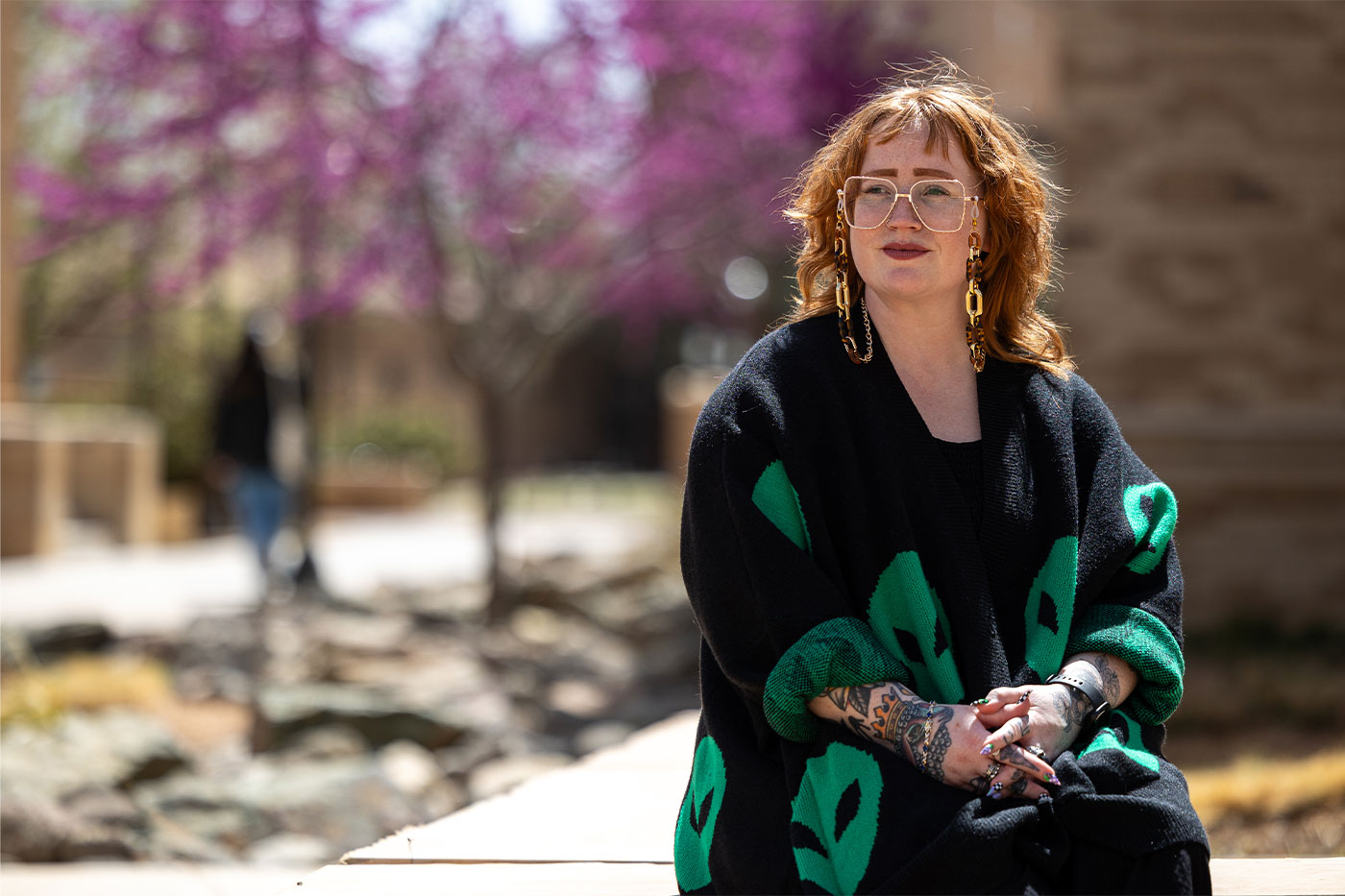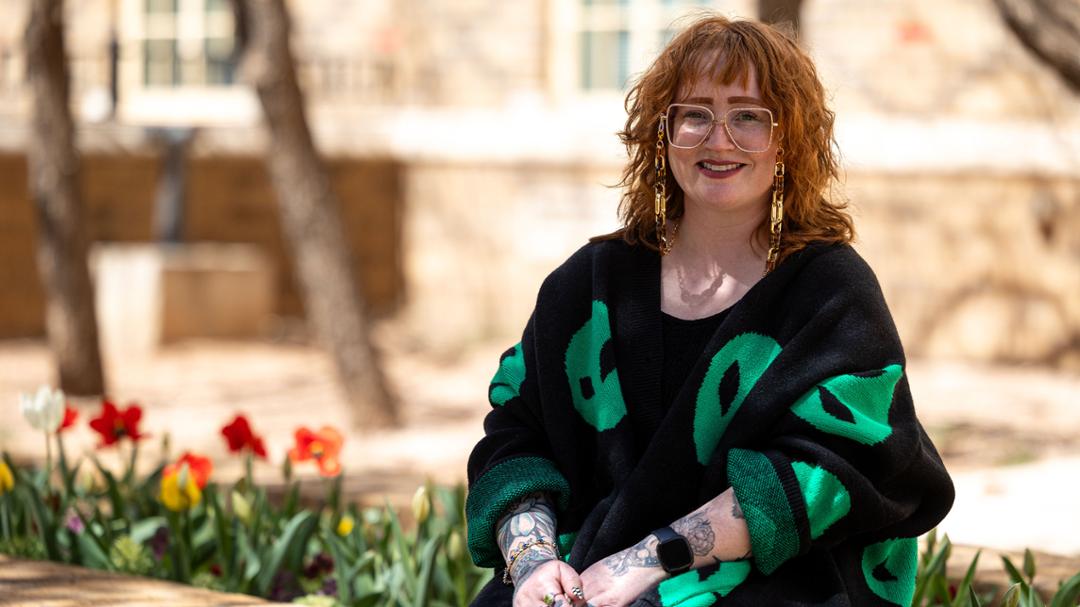Katy Wheeler chose to attend Texas Tech largely because of the opportunities to work at the Burkhart Center for Autism Education & Research.
Katy Wheeler knew she wanted to earn her doctorate to support the autistic community through research and advocacy. It’s been her personal goal ever since she was 19 years old, and she's worked as a behavior technician providing services for autistic children.
“I loved what I was doing,” Wheeler reflected. “I felt like I was able to provide a meaningful service to support kids, families and teachers.”
Katy earned her bachelor’s degree in psychology and master’s degree in special education from the University of Texas at Austin, building a solid foundation to support the autistic community. While much of her previous experiences had been in private clinics, Wheeler found herself working more within schools after graduating.
“Schools are where my heart is,” Wheeler said. “I’m grateful for the formative clinical experience, but as I was working as a professional behavior analyst in schools, it became very clear that I still had more questions about the human experience and children’s experiences in schools. So that’s when I decided to go back for my Ph.D.”
When it was time to apply for doctorate programs, Wheeler targeted educational psychology programs to become a more well-rounded practitioner. She knew she wanted to work with school-aged autistic children, but she felt like she was lacking the necessary skill set and knowledge to do so.
It didn’t take her long to realize Texas Tech University was the school for her. In fact, she was so confident that she ended up only applying to Texas Tech.
Her interest was piqued by the school psychology track of the educational psychology program, but what really sold her on Texas Tech was the Burkhart Center for Autism Education & Research. The center works to increase the quality of life for autistic individuals and their families in Lubbock and the surrounding West Texas area. The center offers a range of services, prepares educators as advocates and conducts research.
Wheeler believed Texas Tech and the Burkhart Center offered the ideal combination of the rigorous research of an R1 institution and the practical, hands-on experience of a teaching institution.
“The center does all of this community service and provides support for the autistic population in Lubbock and West Texas,” Wheeler said. “I was able to work with a school about 50 minutes away from Lubbock. This community outreach of Texas Tech was something that I really appreciated.”
And while the community outreach beyond the program was initially appealing, Wheeler is especially thankful for the community development done within the program.

Wheeler moved to Lubbock to start the doctoral program and work in the Burkhart Center in August 2020. At the time, the school psychology program was offered as a hybrid program with a large portion of the coursework online. Wheeler may have moved to Lubbock, but much of her cohort was based elsewhere.
For an introvert like Wheeler, it could have been easy to feel isolated and disconnected from everyone. But that’s not the Texas Tech way.
“There was a surprising level of closeness for what the program was,” Wheeler said. “I feel like we were actually very tight knit. It’s a testament to the staff and faculty in the program, trying to make those connections between the students.”
Along with virtual and external get-together sessions, Wheeler’s cohort would also volunteer during events like the Burkhart Center’s Burkhart Walk for Autism.
These efforts, Wheeler said, aren’t just to make the remote learners feel a sense of cohort connection; it’s about building a professional network among peers in a field that, according to Wheeler, can feel lacking.
“There’s not enough of us school psychologists nationally, and because of that it can be a very isolating profession,” Wheeler said. “To facilitate those connections with the cohort was a big deal. Now I have people that I can text in the middle of the day, ‘What kind of language would you use for XYZ?’ That sort of thing is a big deal.”
Language plays a significant part in Wheeler’s research. Her dissertation examines the use of parent-child interaction therapy. In one intervention study, she worked with three pairs of mothers and their sons to help build facilitating parent skills to impact the language development of non-speaking autistic children.
While developing her dissertation, Wheeler became a certified parent-child interaction therapist. This, Wheeler said, has been a boon in her professional development, an impact on the way she views her work and even more evidence that Texas Tech was the best choice for her.
Her work as a doctoral student gave Wheeler the chance to further develop her empathy and understanding to better connect with the autistic community.
Wheeler noted that one way she’s connecting better with the autistic community is in the language she uses, opting for identity-first language (autistic person) instead of person-first language (a person with autism).
She described the language debate as nebulous, but Wheeler wants to do right by the community she serves. She’s heard firsthand from autistic students and adults she’s worked with that they prefer identity-first language. Though she was taught person-first language throughout her bachelor’s and master’s degrees, Wheeler is prioritizing the community’s preference.
“Empathy is definitely something that was threaded throughout the program because as a school psychologist there’s an emphasis on special education students served under the Individuals with Disabilities Education act,” Wheeler said. “So being able to develop that skill set was something that was really important to me.”
Wheeler graduated with her doctorate in August 2024 and is wrapping up a postdoctoral position at the Burkhart Center. She will start a tenure-track faculty position at the University of Cincinnati in August 2025.
At Cincinnati, Wheeler hopes to draw on her experience as a doctoral student at Texas Tech. She saw firsthand how intentional Texas Tech faculty were in connecting with students and helping students connect amongst themselves. She’s seen how these connections made among fellow graduate students evolve into professional networks.
“I feel like I’ve gotten the best of both worlds,” Wheeler said, reflecting on the past four-plus years. “I gained this experience both in employment and in study. Moving forward in my life, it has opened doors in my mind and my practice.
“But it’s also going to open spaces for me to be present in and to help disseminate information and impact the students I work for and their parents and teachers.”

